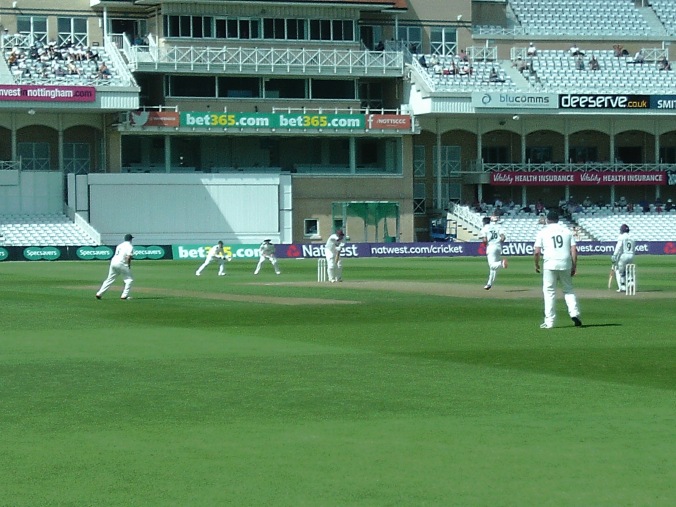Leicestershire CCC (100 & 196) v Warwickshire CCC (400-9 dec.), Grace Road, 10-12 September 2018 (Warwickshire won by an innings and 104 runs)
Leicestershire CCC (321) v Durham CCC (61 & 66), Grace Road, 18-19 September 2018 (Leicestershire won by an innings and 194 runs)
I ended my last post by expressing the hope (hope against hope) that neither Leicestershire’s season, nor the team, would fall apart in September. The first has certainly happened : having lost only two games, both very narrowly, in the first half of the season, since the defeat against Kent we have lost five times, by margins varying from 132 to 328 runs. It is some compensation that we are not alone in having made a succession of low totals. The last month of the season increasingly resembles the climax to an episode of ‘Wacky Races’, filled with spectacular crashes, bits falling off the competitors and some improbable leaps. Predictably so, some would say, if that month is September.
The defeat against Warwickshire was nothing if not predictable. The soon-to-be Champions featured five players with Test experience, and the Division’s three leading run-scorers (three of only four to have averaged over 40). Leicestershire’s cobbled-together side featured two bowlers brought in from Minor Counties, to replace the soon-to-be permanently absent Raine and Chappell, and the injured Griffiths (the regular 2nd XI seamers, too, were injured). Unsurprisingly, Warwickshire exercised their prerogative to bowl first (the game was to be largely played under lights), and, to no-one’s surprise, Leicestershire were bowled out for exactly 100. Barker and Woakes were too swinging for the top order, and Stone, though sparingly used, was too fast for the tail.
There was, at least, an element of comedy to the dismissal of Mark Cosgrove (for the spectators, if not the batsman). Neil Dexter had looked to get off the mark with a single that would have been ambitious had his partner been Speedy Gonzales. Cosgrove is capable of a surprising turn of speed, but it takes him a while to achieve terminal velocity, achieving it, in this case, roughly as he entered the pavilion, the wicket having long since been broken by Woakes in his follow through. If Woakes had really been ‘the nicest man in cricket’, he might have taken pity and deliberately thrown wide.
I left early, having been called away (I have been called away a lot recently, for one reason or another), but stayed long enough to see opener Dominic Sibley (who seems to have grown since I last saw him play for Surrey) make 50 off 49 balls (mostly off one of our Minor Counties seamers, who was quickly removed from the attack). By the end of the day, Sibley had made more runs than Leicestershire on his own, and Warwickshire had nearly doubled our total for the loss of three wickets.
It rained overnight, and for most of the morning. When play began at 2.00, in front of an understandably sparse crowd, the conditions, with the wicket freshly-spritzed, were ideally suited to the seam of Dexter and Abbas. Jonathan Trott resumed on 34, and took forty minutes to make another eight, before mis-timing a pull. This would be the last time that any of us would see Trott in action at Grace Road, and it seemed an appropriate way for him to take his leave, mostly unapplauded, but having seen off the (slight) threat to his side. As conditions eased and Leicestershire’s bowling resources were stretched too thin, Ambrose, Hain and Woakes moved easily to within sight of 400, a target that was reached first thing the next morning, followed by a declaration.
Although Leicestershire offered slightly more resistance in their second innings, the result seemed a formality, and most of the day was spent speculating about comings and goings : amongst other things, I was told that Chappell was definitely moving to Nottinghamshire, which turned out to be true, and that Keith Barker, who had taken eight wickets, would be joining us at Leicestershire, which, unfortunately, turned out not to be.
A ray of light in the gloom

was the performance of Ben Mike, in his second game, who stuck to his task with the ball to take three wickets, and was the top scorer in both innings. Having struck Patel, in a feather-ruffling act of lèse-majesté, for two straight sixes, his was the last wicket to fall, attempting bravely to pull Stone for another six. Like Ben Raine, for whom he looks a plausible replacement, he strikes me as someone who can always be counted upon to go down fighting, which is a useful characteristic for a Leicestershire player to possess.
In contrast to Trott, who had slipped out unnoticed by the back door, as it were, Paul Collingwood’s every move, in his last appearance at Grace Road, was greeted with a standing ovation, to the point where, given his performance, it might, though motivated by genuine affection, have become a slight embarrassment to him. The first ovation came when he led his side on to the field, having, not unreasonably, chosen to field.
Leicestershire opened with the novel pairing of Sam Evans and Atiq Javid : at first, I assumed that regular opener Harry Dearden must have missed his bus, but it was revealed to be a deliberate tactical switch, and a successful one, with Atiq, whose average in the Championship prior to this game was in single figures, allowed to give free rein to his defensive instincts to make a maiden fifty at Grace Road. Dearden too, when he batted at five, appeared more at ease, as if the move had allowed him to loosen his stays a little.
Though Atiq’s was the only fifty of the innings, all of Leicestershire’s batsmen reached double figures, to finish the day on a hopeful 316-8. Most creditably, Mark Cosgrove, who is struggling through an unprecedented loss of form, managed to gouge out 38 painfully acquired runs, persistently attempting to play his favourite off-side strokes to balls that didn’t really invite them. If a slimmer batsmen, or one who has less hope of recovering his form, was struggling so to do what had been used to doing effortlessly, the effect would be more tragical.
Leicestershire’s total would have been smaller had Collingwood not dropped two catches in the slips (though, needless to say, he received a standing ovation as he left the field).

Of the bowlers, the mountainous Rushworth

deserved more than his two wickets. Mark Wood, though apparently pained by his ankles, was treated respectfully, watched by James Taylor, presumably there with his scout’s cap on (unless he, too, was there to say goodbye to Collingwood).
Whatever else you can say about this season at Grace Road, it has rarely been dull, and what turned out to be the last day there this year coincided with the arrival of Storm Ali. At the storm’s height, the players paused to gaze anxiously at one of the floodlights, which had begun to sway alarmingly : the only way that the season could have ended any more dramatically would have been if it had blown over and demolished the Meet.

The day had begun with a slight disappointment for Leicestershire, their last two wickets falling with the total still short of the 350 required for another bonus point (Mohammad Abbas later apologised for having played a “lazy shot”). It was at this point that the wind really began to get up (particularly the Durham batsmen). With his fourth delivery, Abbas, bowling with the swelling gale behind him, a rider on the storm, took the wicket of Cameron Steel (who had scored a double century in the same fixture last year) ; by the end of the eleventh over he had taken five wickets, with the score on 18. Bowling into the gale, Neil Dexter had bowled five consecutive maidens.
Abbas’s last victim had been that of Paul Collingwood, who was cheered to the wicket, and cheered back again one ball later.

On another day, I would have expected the visitors to have found some way to recover a little ground, even if only through the thrashing of the tail, but, as the gale reached its peak, the batsmen seemed as spooked as cats in a thunderstorm. Though efforts were made to tether it, the bell that is rung to signal the start of play began to ring of its own accord, like the ghostly church bells of a drowned village, tolling the knell for each departing batsman, and, at times, it seemed as if the sightscreen might blow over, flattening them before they could reach the wicket.
Like jackals finishing off a lion’s kill, Dexter (whose figures were 7-6-1-1), Griffiths and Mike polished off the remaining batsmen. Alex Lees, who had, at least, battened down the hatches while others abandoned ship, narrowly missed carrying his bat for a single figure score. Research soon revealed that the total of 61 was Durham’s lowest first-class score, a record that was in danger of being broken when they batted again, until a last wicket stand of seven between Rushworth and Wood enabled them to reach the comparative respectability of 66.
Mohammad Abbas, who may not have been quite unplayable, but was certainly largely unplayed, had taken another five wickets (his powers perhaps enhanced by his newly awarded “gold fox“),

to give him 10-52 in the match. Collingwood received his final ovation, about two hours after his previous one (including the lunch interval), as he left the field for the last time, having been bowled by Abbas for five. His expression as he left the field was hard to read, but I don’t think it signalled unmixed delight.


There was further applause as Collingwood was the first to congratulate Abbas, as he (modest to the last) had to be pushed into leading the Leicestershire players from the pitch.

From the Leicestershire dressing room soon came the merry, if unmelodious, sound of Paul Nixon leading the community singing, and the prising off of beer bottle tops : from the Durham side, a silence so deep and ominous that it could be felt half way down Milligan Road.
The last few games of a season, as departing players are left out and new players introduced, sometimes reminds me of the publishing fad of printing the first chapter of its sequel at the end of a novel, as an inducement to buy. The sequel to Leicestershire’s season seems a lot more enticing if it will feature Mohammad Abbas (as, happily, it should), rather than the Abbas-less sequel suggested by the last game of the season (a defeat away to, of all people, Glamorgan).
Although the endless love-smothering of Collingwood felt a little incongruous in the circumstances, it does suggest an understandable desire not to allow players to slip from sight without some appropriate farewell. It seems a pity that Ned Eckersley, whose release was announced shortly before the Durham game, was not allowed one last home game. Rather as when someone has died unexpectedly, I tried to recall my final sight of him in Leicestershire colours, which must have been of him being bowled by Keith Barker for a perfectly honourable 77-minute 23. If I’d known at the time, I would have clapped a lot longer and harder.
It seems churlish to complain about an excess of excitement, but I do sometimes yearn for the kind of season’s end we used to have in the days of a one division Championship, when sides with nothing to play for would drift off into the close season through somnolent draws, as if in a mildly opiated haze (which, at least, allowed some space for reflection).
With Leicestershire down in the valleys, I tried a day at Northampton, where Northants, who have had a season that has been poor even by Leicestershire’s recent standards, were taking on Sussex, badly deflated by having been overtaken at the last minute by Kent, but even here there was no peace to be found : again, twenty wickets fell in the day, though, on this occasion, ten from each side, and both sides managed to creep into three figures.

Bye!
The very last day of the season took me to Trent Bridge, where Nottinghamshire were due to resume their second innings needing another 215 to avoid an innings defeat, with seven wickets remaining. Clearly, there was little chance of Nottinghamshire saving the match, but I hoped they might spin things out for long enough for me to see some of those long shadows on the County Ground.
As I was contemplating where to sit, Ben Slater was caught behind by Trescothick from the bowling of Craig Overton. As I took my seat, Samit Patel was out in the same way to his first ball (prompting an unimpressed Nottinghamshire supporter to shout “Why not give him a standing ovation?”). Overton’s first ball to Wessels was identical to the previous two, and there seemed nothing the batsman could do other than nick it to Trescothick. It was a good job that Trescothick had announced that he wouldn’t be retiring for another year, or we would never have got home for all the ovations.
My season ended shortly before lunch, with the sun still high in the sky, and the shadows only slightly lengthening.





